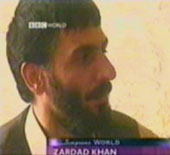Amnesty International urges the UK Government to investigate a recent BBC Newsnight report that Zardad, a former Afghan commander who is currently living in London, was responsible for grave human rights abuses between 1992 and 1996 in Afghanistan.
|
The program revealed that Zardad had killed unarmed civilians and he and his men have been involved in acts of torture, including rape, and that he allowed his men to carry out these human rights abuses.
The UK Government is obliged under the Convention against Torture, which it ratified in 1988, to ensure that the perpetrators of serious human rights violations are brought to justice.
"No matter where the acts of crimes against humanity, war crimes or torture are committed and no matter the nationality of the suspected perpetrator or victim of such crimes, under international law all states must conduct an inquiry when there are serious allegations that a person who participated in such crimes is present in the territory of the state," Amnesty International said.
Failure on the part of the UK Government to investigate these reports may conceal a shared responsibility for abuses. Many Afghan commanders were able to commit human rights abuses by the very weapons that governments, including the UK government, supplied to them in the past.
The case of Zardad highlights a web of unaccountability inside and outside Afghanistan which is continuing to facilitate human rights abuses against the Afghan people. To date, individuals against whom there are serious allegations have been able to travel freely and without fear of prosecution.
Should an investigation reveal sufficient admissible evidence, Zardad should be prosecuted in the UK. If Zardad were to be returned to Afghanistan he is likely to receive an unfair trial and face execution.
Background
The civilian population in Afghanistan has been held hostage to the deeds of the armed groups for the past 21 years. Serious human rights violations were committed by the personnel of the former Soviet troops during their occupation of the country. They were committed by certain categories of the personnel of the Pro-Soviet Afghan governments' secret police known as the KHAD.
Thousands of civilians in Kabul were killed during the indiscriminate bombing of Kabul between 1992 and 1995 by armed groups such as the one Zardad belonged to. Even in recent years civilians have been massacred by the Taleban guards.
Under the Convention against Torture, any state should undertake to investigate and, if there is sufficient admissible evidence, prosecute those suspected of crimes against humanity, war crimes or torture regardless of where the crimes were committed, the nationality of the person responsible and the nationality of the victims. Such proceedings must be in accordance with international standards for fairness without recourse to the death penalty.


